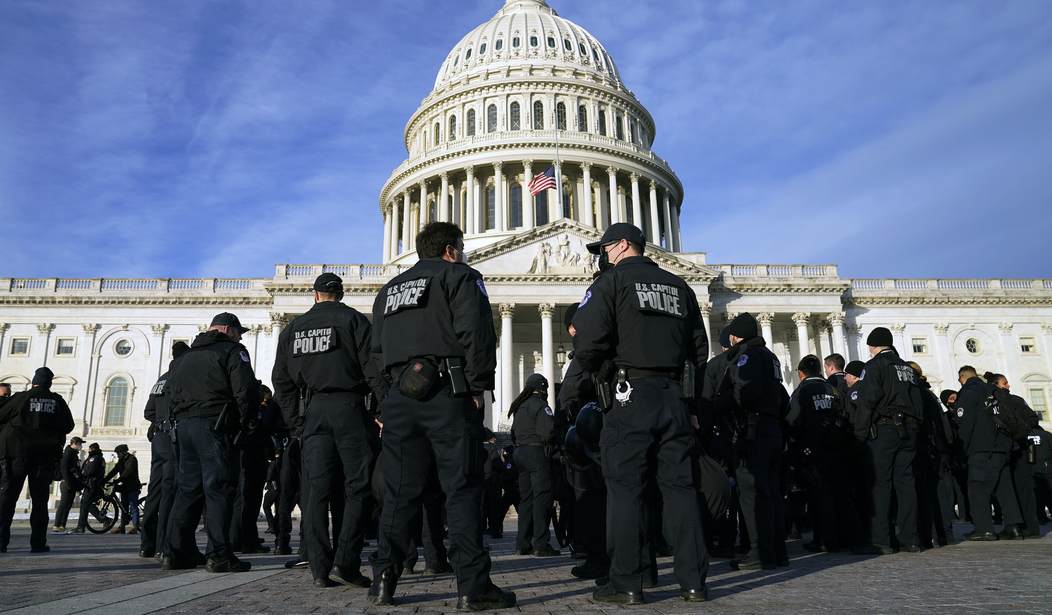A recent review of court records reveals an alarming trend at the U.S. Department of Justice (DOJ) concerning its treatment of January 6 Capitol riot defendants. Federal prosecutors have deployed a tactic of seeking to impose fines on defendants, in addition to their prison sentences with the alleged goal of preventing them from financially benefiting from their participation in the 2021 events in DC, especially in cases where the accused has received a court-appointed public defender. Attorneys for the defendants see the DOJ’s fine requests as impairing rights to legal representation.
Legitimate Fundraising?
Shortly after pleading guilty to his involvement in the events at the U.S. Capitol, Daniel Goodwyn, a resident of Texas, made an appearance on Tucker Carlson’s former show on Fox News. During the interview, he told audiences that supporters could donate money to him and fellow defendants, who were referred to as “political prisoners” on the site. Now, the DOJ is seeking to recover more than $25,000 that Goodwyn raised through his fundraising efforts.
Goodwyn’s sentencing is scheduled for later this month. Defense attorney Carolyn Stewart described the DOJ’s prosecutors as “demanding blood from a stone” for seeking the fine. In court documents, Stewart wrote:
He received that amount in charity to help him in his debt for legal fees for former attorneys and this for unknown reasons is bothersome to the government. Mr. Goodwyn did not collect the funds for legal services and then use a public defender. He saved the taxpayers that cost. Mr. Goodwyn does not hold title to the funds when they are donated. When funds are sent to him from the “donor box” recipient, Mr. Goodwyn pays the debt that is 100% related to January 6th. He makes payments (as shown in detail to the investigating Probation Officer) that are for debt of approximately $75,000 for “legal services” – which costs the undersigned and Mr. Goodwyn cannot begin to explain. Mr. Goodwyn will be paying approximately three times the amount he received in charity. He has no money to pay a fine.
The majority of the fundraising efforts take place on GiveSendGo, which has become the primary platform for defendants banned from using other mainstream crowdfunding sites, including GoFundMe. GiveSendGo, dubbed “The #1 Free Christian Fundraising Site,” defends its decision to permit the platform to be used in legal defense fundraising efforts for the J6ers. The site’s Co-founder, Heather Wilson said the policy:
…is rooted in our society’s commitment to the presumption of innocence and the freedom for all individuals to hire private attorneys.
Read More:
Investigating the Investigators: Rep. Loudermilk Announces Probe Into the Jan. 6 Committee
Former Capitol Police Officer Gives Force an ‘F’ Grade for Jan. 6 Preparedness
$25,000 Revoked
Earlier this month, Nevada resident Nathaniel DeGrave was sentenced to more than three years in prison, taking a plea agreement for his role in the Capitol riots on charges of Conspiracy to Obstruct an Official Proceeding, and Assaulting, Resisting, or Impeding Officers. Along with his imprisonment, DeGrave was also ordered to pay a $25,000 fine. Prosecutors noted that Degrave “incredibly” raised over $120,000 using GiveSendGo campaigns featuring what the government called “catchy titles,” citing DeGrave’s portrayal as “Beijing Biden’s political prisoner” in “America’s Gitmo,” a reference to the U.S. Guantanamo Bay detention center in Cuba.
The prosecution wrote:
He did this despite seeking to cooperate with the government and admitting he and his co-conspirators were guilty since at least November 2021.
Attorney William Shipley, who represented DeGrave and more than two dozen other Capitol riot defendants, said he advises clients to avoid fundraising under the claim of being a political prisoner if they intend to plead guilty.
Until they admit they committed a crime, they’re perfectly entitled to shout from the rooftops that the only reason they’re being held is because of politics. It’s just First Amendment political speech.
Shipley said he provided the court with documents showing that his client raised around $25,000 beyond what was paid to his legal team, admitting that he’s never had to submit these kinds of records previously in his legal career. Shipley said:
I’ve never had to do it until these cases because I’ve never had clients that had third-party fundraising like this. There’s a segment of the population that is sympathetic toward the plight of these defendants.
Use of Public Defender
Virginia resident Markus Maly, who is set to be sentenced for assaulting police officers at the Capitol, managed to raise over $16,000 through an online campaign that called him a “January 6 P.O.W.” and sought financial assistance for his family. In response, prosecutors have requested a fine exceeding $16,000, arguing that Maly was provided a public defender and had no outstanding legal fees.
According to legal filings, the prosecutor argued that Maly sought to profit from his criminal actions in the breach of the Capitol. The prosecution wrote:
He should not be able to use his own notoriety gained in the commission of his crimes to ‘capitalize’ on his participation in the Capitol breach in this way.
Strand on the Stand
Dr. Simone Gold, a California physician and figure in the health freedom movement, entered the capitol alongside co-defendant, John Strand, who the government calls “a former television actor and fashion and romance novel cover model,” in court filings.
A jury convicted Strand and prosecutors sought a fine on top of a prison term. On Thursday, District Court Judge Christopher Cooper sentenced Strand to 32 months in prison, and a $10,000 fine, albeit lower than the amount requested by the DOJ. The fine was levied, in part, due to Strand’s fundraising off of his conviction for legal defense purposes, although he was being represented by taxpayer-funded and court-appointed counsel.
In the sentencing request, prosecutors wrote:
Strand frequently urged listeners to donate money to him to support his “legal defense,” often by pointing them to his website
On the website, Strand decries “the unfettered political persecution” and “political apartheid” that gave rise to his conviction, while asking for financial donations, which can be made through the website.
Prosecutors wrote that Strand continues to fundraise on his version of events:
Strand has raised, and continues to raise, money on his website based upon his false statements and misrepresentations on the events of January 6.
The government argued that Strand raised over $17,000 for his legal defense and didn’t disclose that he was using court-appointed representation, all while having “substantial financial means,” living in a home that was purchased by Dr. Gold last year for more than $3 million.
Gold’s $3.6 million house, purchased with donor money given to the nonprofit group, America’s Frontline Doctors, is now at the center of a major legal fight over the group’s future. After the AFLDS board conducted a forensic audit, Gold was ousted and Strand’s $10,000 per month employment was ended. The case against Gold was brought by attorney Joey Gilbert, who previously ran as a candidate for Nevada Governor in the Republican primary.
On Strand’s employment, Gilbert tells RedState:
I fired him, I shut off his credit cards.
After initially ousting Gold, who claims her “leadership hiatus” was “self-imposed,” Gilbert resigned from the AFLDS board, according to an accusatory press release issued by Gold on Wednesday.
Attorney Gilbert tells RedState:
I resigned the chairman position months ago.
On the continued accusations levied by Gold, Gilbert said he was cleared by an independent investigation conducted by Wagenmaker and Oberly, a legal group out of Chicago that serves nonprofit and tax-exempt status organizations. Gilbert reports that the independent investigation cleared him of the allegations.
On the litigation, Gilbert tells RedState:
I never wanted to be in the adversarial position I was in, I just didn’t really have a choice. If she would have listened to her attorneys to bring the foundation into compliance… instead of that, she came out guns blazing.
Regarding the contentious purchase of the home, Gilbert says:
The house is owned by the foundation and Simone Gold lives in it rent-free. We thought it was a compound for the foundation. No, it was a personal residence for her and John Strand.
Gilbert explains the circumstances of the purchase, saying:
I thought we were purchasing a compound for the foundation. After a purchasing agreement has already been signed, I find out it’s a personal residence for Simone Gold. I told her that she can’t do this under nonprofit tax-exempt law and she just doesn’t want to hear it.
Gilbert says his prior role as chairman required him to address the property purchase, saying:
All I was trying to do was follow the law. This house was a big situation, the board tried to bring it into compliance.
Gilbert recalls his conversations with Gold while she was incarcerated, saying:
I told her, ‘You’ve got me in a bad spot here, as the Chairman you’ve told me that an investor would take the house… we’re gonna have to sell it.’ We did everything as a board to get this thing ready to sell in August and September.
On the current situation, Gilbert tells RedState:
As far as I understand the foundation is trying to evict her from the house and sell the house.
During Strand’s sentencing, Judge Cooper said:
It seems to me that you want to be perceived as a martyr, the face of the January 6 defendants. I think you want to cultivate that and profit from that.
Judge Cooper added:
I think you enjoy the notoriety.
Declined DOJ Request
While Strand’s case may demonstrate “grifting” off of sympathetic donors and not disclosing financial realities, the increasing number of requests for fines by DOJ prosecutors indicates a trend that may discourage or seek to punish financial fundraising for J6 legal defenses. But not all of the prosecutors’ requests are getting rubber-stamped.
In the case of Peter Schwartz, of Kentucky, federal prosecutors sought a more than $70,000 fine. Schwartz has been sentenced to more than 14 years in prison, one of the longest J6 sentences handed down so far, for attacking police officers with pepper spray and a chair. U.S. District Judge Amit Mehta sentenced Schwartz to prison but refused to impose a fine.
Prosecutors alleged Schwartz tried to profit from his campaign seeking donations, called “Patriot Pete Political Prisoner in DC.” But an attorney for Schwartz, Dennis Boyle, denies that there is evidence to prove that was his client’s intent. Boysal said the judge’s order:
…basically said that if the money was being used for attorneys’ fees or other costs like that, there was no basis for a fine.
It is important to remember that these defendants are innocent until proven guilty, and they have the right to seek financial support for their legal defenses. The timing of these requests from the DOJ coincides with the sentencing of some of the most high-profile defendants facing the most serious charges and longer prison terms, thus raising questions about the government’s motives and its desire to make examples out of these individuals.
Former President Donald Trump has pledged to pardon most of the January 6 prisoners, if re-elected to the White House, while Florida’s Governor Ron DeSantis, who is also seeking the GOP presidential nomination, has vowed to issue pardons, similarly.














Join the conversation as a VIP Member